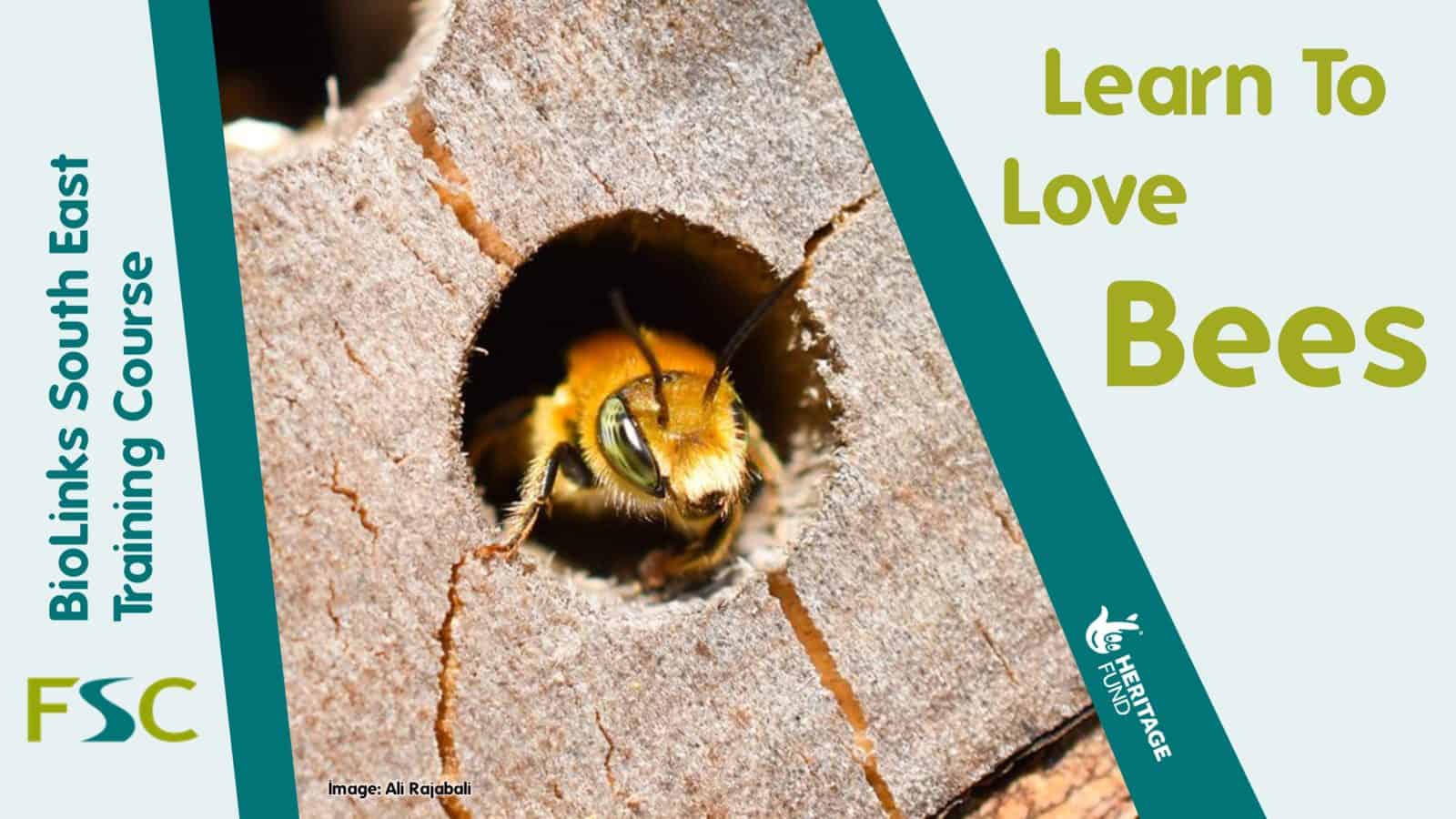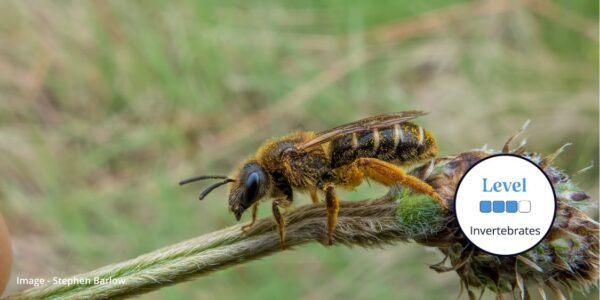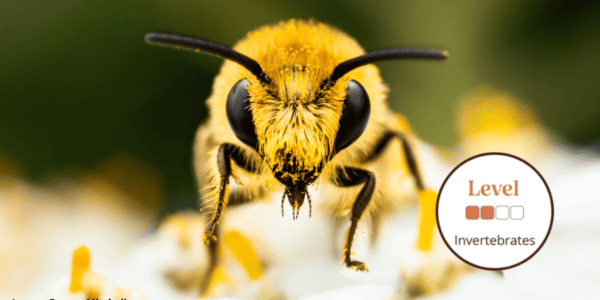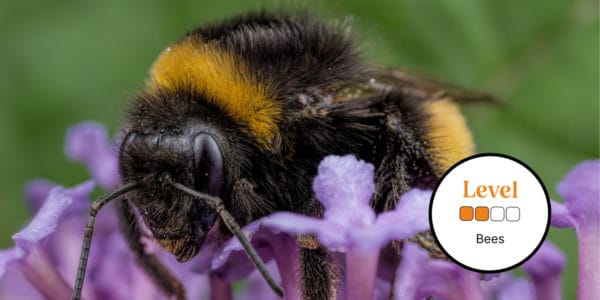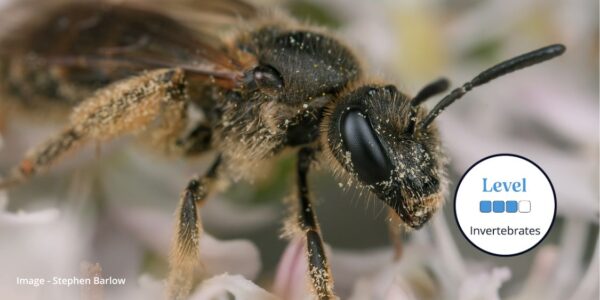There are around 270 species of bee in Britain, although many are under-recorded, under-appreciated and under-loved! Found in a range of habitats, bees have fascinating life histories and ecosystem roles.
If you’re interested in finding out more about bees but don’t feel ready for a beginner’s ID workshop, then this is the course for you. Learn To Love Bees is a very gentle introduction to our planets most important pollinators, introducing aspects of their biology and ecology.
This course combines the use of classroom-led learning and outside learning opportunities led by one of our bee tutors to give individuals the skills and confidence to learn more about the lives and ecological role of bees.
- Certificate upon course completion.
- Please email [email protected] if you have any questions.
- Please note that this course is NOT a species identification course and will only go as far as categorising British bees into broad categories.
This course is aimed at adults only and course attendees must be at least 18 years old in order to attend.
What will be covered during this course?
- Recognising bees from other similar looking insects and discussing their place in the animal kingdom.
- An introduction to bee biology, including their anatomy and morphology.
- An overview of the species diversity of bees in the UK
- The role of bees in the process of pollination and reproduction in flowering plants.
- How to go about finding wild bees in different habitats.
See the ‘Example Timetable’, ‘What’s Included’ and ‘Before YouAttend’ sections below for more information about this course.
Course Fees
Regular Price: £75 For professionals and residents outside of the UK. Select ‘Attendee: In Person’ Sold Out
Subsidised Price: £10 Subsidised by the FSC BioLinks project for non-professionals eg. volunteers, biological recorders, wildlife gardeners, amateur naturalists and students. Available to UK residents only. Select ‘Attendee Subsidised: In Person’
Tutor: Mark Patterson
Mark Patterson is a professional ecologist and community gardener. He was interested in nature from a young age. Initially focusing on birds Mark became interested in Bees whilst studying for his ecology degree. Mark has now been a beekeeper for almost 10 years, worked as a DEFRA Bee inspector and has become a keen wild bee enthusiast and recorder. He runs regular guided Bee walks in London parks and gardens where his recording efforts have improved understanding of Bee diversity in the city’s urban parks. Mark also campaigns for protection and enhancement of London’s green spaces and through his consultancy business works with landowners to establish pollinator habitats.
Covid Measures
In order to keep our customers and staff safe, we ask that anyone attending our centres:
- Wears a face covering when in shared indoor space (unless exempt).
- Maintains social distancing.
- Cleans their hands regularly.
- Takes a Covid-19 test before they arrive.
Book with Confidence
We understand the difficulties of making plans in the current situation when guidelines continue to change, and insurance conditions are being tightened. In response, we will continue to offer additional flexibility. Find out more here
Example Timetable
- Please arrive in time for the course to start promptly at 10:00 am.
- Refreshments will be available from 9.45 am.
- The course will end at 4:00 pm.
What's Included
- 6 hours of tuition
- Certificate of attendance
- Any excursions will be on foot
Bursaries and Subsidies
FSC BioLinks
FSC BioLinks is an exciting project for FSC in the South East and West Midlands, bringing together existing volunteers with skills in biological recording and identification, and new volunteers.
This project provides subsidised training courses, learning opportunities and digital tools focussed on invertebrate identification for anyone involved or interested in biological recording, to build and strengthen the community.
Invertebrates provide us with many useful ecosystem services, like pollination and decomposition, which we cannot survive without but their numbers are declining. Few people know how to identify or record invertebrates meaning there is a lack of data
We are delighted to have been awarded a grant of £1.23 million from the National Lottery Heritage Fund for this project.
Before You Attend
Getting to Tower Hamlets Cemetery Park
Southern Grove, London E3 4PX
- Tube: Zone 2. Mile End and Bow Road tube stations and Bow Church DLR station are all nearby.
- Bus: D6, D7, D8, 25, 277, 323, 339 Bus stops are located on Mile End Road or Burdett Road.
- TfL bicycles: at Southern Grove, Knapp Road, Mile End Road, and Grove Road.
- Car: There is no general access parking in Tower Hamlets Cemetery Park. There is free parking on the local streets at weekends.
Due to the prospect of some outside observations as part of this course, participants are advised to bring suitable clothing and footwear in order to access the site.
What to bring
- Notebook and pencil
- Lunch
There will be a member of staff with first aid training and access to a first aid kit on site. If you have special medical requirements please let us know as soon as possible so we can plan the course.
This BioLinks course has aspects that will be taught outdoors with walking to field sites over uneven ground. No special preparation is required providing you are used to gentle exercise. If you have any concerns or questions about access or the activities involved, please get in touch.
Sorry this course has ended

